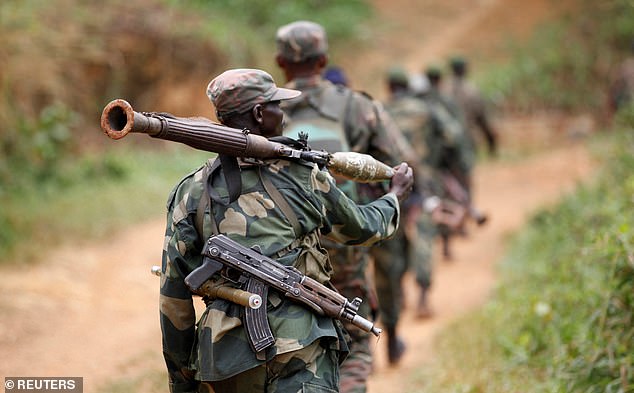Isis-linked rebels have brutally slaughtered 89 innocent civilians in multiple attacks across east Congo.
The violent assaults were carried out by fighters from the Allied Democratic Forces in several localities of North Kivu province between November 13 and November 19, and the 89 killed included at least 20 women and an undetermined number of children.
In one of the attacks the rebels attacked a health centre operated by the Catholic Church in Byambwe, killing at least 17 people including women who had gone there to receive maternity care and setting alight four wards housing patients.
Other violations committed by the rebels included abductions in nearby villages and the looting of medical supplies.
Col. Alain Kiwewa, the territory’s administrator, said: ‘Attacks on health facilities are a crime against humanity.
‘These despicable acts must not go unpunished,’ Kiwewa said
A UN peacekeeping mission known as MONUSCO said it a statement on Friday: ‘MONUSCO urges the Congolese authorities to promptly initiate independent and credible investigations to identify the perpetrators and accomplices of these massacres and bring them to justice’.
Local officials said last month that suspected ADF rebels had killed 19 civilians in an overnight attack in the village of Mukondo in North Kivu province.

FILE PHOTO: Democratic Republic of Congo military personnel (FARDC) patrol against the Allied Democratic Forces (ADF) in 2013
In September, the ADF claimed responsibility for one of its deadliest attacks in recent months that claimed the lives of more than 60 civilians at a funeral in eastern Congo.
A recent flurry of attacks claimed by the ADF has exacerbated insecurity in east Congo, a mineral-rich region where Rwandan-backed M23 rebels staged a major advance this year.
The ADF started as a rebel force in Uganda but has been based in the forests of neighbouring Congo since the late 1990s, and is recognised by Islamic State as an affiliate.
Congo’s army and Ugandan forces have pursued operations against the ADF, but the group’s attacks continue.
Other parts of North Kivu province are under the control of Rwanda-backed M23 rebels who staged a lightning advance this year.
Mediators including the United States and Qatar are trying to broker peace in that conflict, which Washington hopes will facilitate Western investments in the mining sector.
Africa is rapidly becoming the new heartland of global jihad, as franchises of IS, Boko Haram, and Al Qaeda have been carving out strongholds across the continent.
In 2024, an estimated 18,900 people were slaughtered in attacks linked to militant Islamists, a staggering toll that underscores the continent’s growing struggle to contain extremism.
Over the past three years, the annual death toll has averaged more than a third higher than between 2019 and 2021, with many victims bombed, beheaded, stoned to death, or hacked with machetes.
Brutal rapes, public executions, and forced marriages have been used to assert dominance in areas controlled by the various groups.
Al Qaeda’s main African spearheads are al Shabaab in Somalia and Jama’at Nusrat al Islam wal Muslimin, known as JNIM, in the Sahel.
ISIS operates through a web of ‘provinces’ in West Africa, the Sahel, Mozambique, Somalia and Libya.
In Nigeria, the original Boko Haram movement has splintered into rival factions that now fight both governments and each other.
In the Democratic Republic of Congo and Uganda, the Allied Democratic Forces, rebranded by ISIS as Islamic State Central Africa Province, continues to massacre civilians in Ituri and North Kivu.

